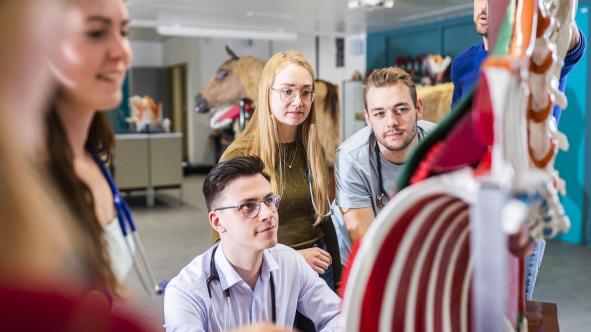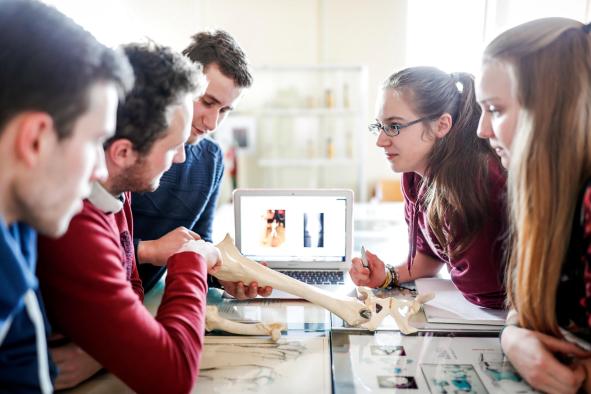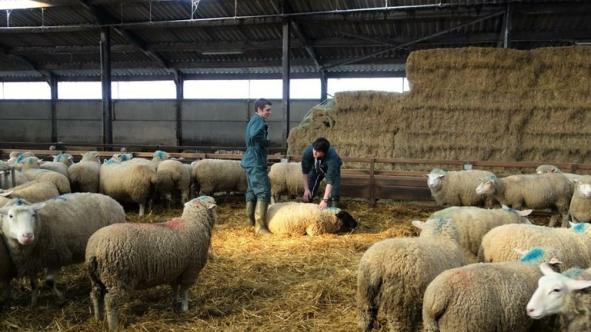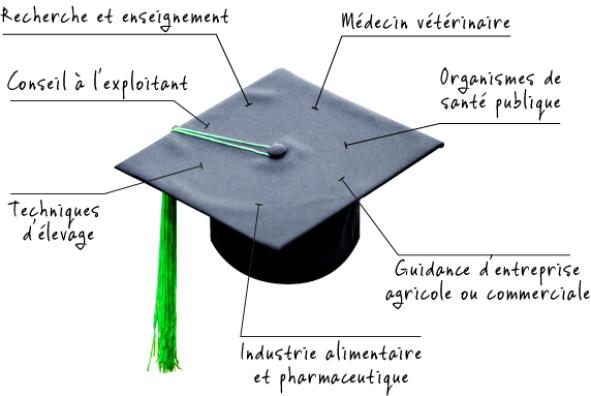Bachelor in Veterinary Medicine
-
Schedule
regular course
- ECTS Credits 180

Veterinary medicine training at Namur is based on both the acquisition and application of knowledge and regular contact with animals.
The first block aims to develop a solid scientific foundation and discover the animal (understanding its behavior and studying its morphology).
Thereafter, you continue to learn the fundamental disciplines (biochemistry, microbiology, genetics...). Many courses are animal-oriented, such as the anatomy of the locomotor system and organs (splanchnology), as well as their formation (embryology). You'll also study the physiology of different systems (respiratory, cardiovascular, reproductive, digestive, nervous...).
Finally, an applied ethology course looks at behavioral disorders in domestic animals, the human-animal relationship, and notions of well-being and stress.
You're off to a good start
- you're passionate about animals and have excellent contact with them;
- you're comfortable with scientific subjects;
- you're open-minded about life sciences.
Teaching methods
Participation in care, lambing, dissection labs, medical imaging, problem-based learning in clinical teams... everything is done to promote mastery of concepts and develop your practice in contact with animals.
Practical work and care at the university's didactic farm
From the very first year, you'll have the opportunity to establish the link between theory and practice through regular, supervised contact with different animal species: horses, dogs, sheep and cows. You learn to observe them, handle them and understand their behavior.
At the educational farm, you'll take part in lambing and provide care for newborns, and witness the monitoring of a large herd.
In the laboratory, dissection sessions, surgery simulation, medical imaging, problem-based learning, topographical anatomy... illustrate anatomy, embryology and splanchnology courses. Practical sessions introduce you to various aspects of animal physiology; for example, blood groups, blood coagulation, electrocardiogram, sports medicine.

Group activities and team clinics
In groups made up of students from different years, you discover the animal in a more practical way, under the supervision of older students who fill the role of tutors. Based on real-life clinical cases, you learn about your future profession, but also about team spirit, flexibility and self-criticism.
Interdisciplinary seminars
Conferences and debates confront you with the issues facing society and the roles veterinarians can play in them. Issues such as farm animal welfare, animal rights, animal epidemics, natural disasters... concern both the veterinarian and society.
Integrated tutorials
Thanks to the collaboration of teachers, integrated activities enable you to make the link between different subjects (statistics-genetics-ethology, physiology-splanchnology, physiology-biochemistry...).
End-of-cycle work and student-research
Through the analysis of a scientific question, you develop a scientific and critical mind, essential in medical decision-making.
This work can take the form of a bibliographical or research study. In this case, you obtain student-researcher status. You take part in writing protocols, collecting data, analyzing them, publishing results in scientific journals and communicating them at conferences.
Zootechnical internships
You also have the opportunity to carry out zootechnical internships on farms or in companies.
The educational farm at Faulx-les-Tombes
An exceptional infrastructure dedicated to teaching!

Organization of assessments

January, June and if necessary August... three sessions to demonstrate your mastery of the subjects
In January of your first year, you sit the exams on the UEs of the 1st quadrimester. Attendance at this test is compulsory for admission to the end-of-year exams.
- If you obtain an average greater than or equal to 8/20, you continue your 1st year bachelor's degree in veterinary medicine in the second quadrimester.
- If you obtain an average of less than 8/20, the jury invites you to a personalized interview for advice. The possibility of reorienting towards other study programs, possibly in the health sector, at university or at a university of applied sciences may be considered.
However:
- you can ask to follow a remedial program in the science UEs with a view to a possible continuation of the veterinary medicine curriculum (or reorientation) with valorization of the credits obtained for the UEs of the first quadrimester;
- you can also ask to follow a lightening of the UEs of the program of the second quadrimester to enable you to sit the veterinary medicine competitive examination only in June of the following year.
In June, you take the exams for the UEs of the 2nd quadrimester to obtain the credits. This exam is only held at the end of the second term, and establishes a ranking based on the average results obtained. To proceed to the next stage of training, two conditions must be met:
- obtain the first 60 credits of the bachelor's degree;
- rank "in useful order", i.e. within the quota of students to whom the university is entitled to issue the attestation authorizing the continuation of veterinary medicine studies, i.e. the 120 credits completing the bachelor's degree in veterinary medicine.
The competitive examination tests are based on multiple-choice questions.
According to the choice of the professors, the examinations for the second part of the bachelor of veterinary medicine studies may be assessed either in writing or orally. Assessment procedures are specified during the first course and are detailed on the university website.
Success aids
Succeeding in a year of study at university involves many challenges.
To help you meet them, UNamur supports you in developing your disciplinary, methodological and human skills... with the support of numerous professionals.
Preparatory courses, individualized help... Discover the schemes set up for your training.
After the baccalauréat: the master's degree
After obtaining the bachelor's degree in veterinary medicine, you have access to the master's degree in veterinary medicine. This second cycle can be taken at the University of Liège, Ghent University or any other university in Europe and gives access to the practice of veterinary medicine.
The master's degree awarded in Belgium is valid throughout Europe. Belgian expertise is recognized and veterinarians easily find employment abroad. There, they can practice their profession in the professional, family or geographical context of their choice: conventional practice, wild animals in zoos and reserves, development cooperation...
-
<unknown>
Code Name Staff Th.+Ex. Credits/Block 1 2 3 SVETB198 Chemistry and Life Physics Aprile Carmela Hontoir Fanny Lobet Michaël Colaux Julien Baillieul Diane HEUSKIN Anne-Catherine 5h th. + 25h ex. 3 SPHYB112 Physics I - Mechanics and waves HEUSKIN Anne-Catherine 50h th. + 24h ex. 6 SPHYB113 Syllabus, webcampus, Teams. Colaux Julien 25h th. + 11h ex. 3 SPHYB114 Physics III - Optics Colaux Julien 25h th. + 10h ex. 3 SCHIB103 General chemistry Aprile Carmela 60h th. + 25h ex. 8 SCHIB106 Organic chemistry Baillieul Diane 40h th. + 20h ex. 6 -
<unknown>
Code Name Staff Th.+Ex. Credits/Block 1 2 3 MBIOB132 Biostatistics I Bihin Benoît Bihin Benoît 26h th. 2 MBIOB133 Biostatistics II Bihin Benoît Bihin Benoît Bihin Benoît 26h th. + 16h ex. 2 SSPSB208 Interdisciplinary surveys and seminars Gillet Nicolas Vandeweerd Jean-Michel Muylkens Benoît Pontarotti Gaëlle Diederich Claire Hontoir Fanny 15h th. + 30h ex. 2 SSPSB107 Philosophy and religious studies Pontarotti Gaëlle LAURENT Nathanaël 52.5h th. 3 SVETB314 Analysis and defence of a scientific question (end of cycle personal work) Cambier Carole Vandeweerd Jean-Michel Vandeweerd Jean-Michel 5h th. 4 -
<unknown>
Code Name Staff Th.+Ex. Credits/Block 1 2 3 SVETB218 Physiologie animale I Thoré Eli Hontoir Fanny Missawi Omayma 25h th. + 16h ex. 4 SVETB225 Biochemistry Boonen Marielle Hennequart Marc 30h th. 3 SMEDB200 Biochemistry of domestic animals I Hennequart Marc 30h th. + 30h ex. 4 SVETB228 Animal physiology II Hontoir Fanny 35h th. + 15h ex. 5 SMEDB306 Biochemistry of domestic animals II Hennequart Marc 30h th. 4 SBIOB105 General biology Hallez Régis 35h th. + 24h ex. 5 SBIOB206 Genetics applied to veterinary medicine Matroule Jean-Yves 30h th. + 15h ex. 5 SBIOB104 Animal biology Silvestre Frédéric 35h th. + 12h ex. 5 SVETB302 Integrated cellular and molecular biology Muylkens Benoît 20h th. 3 SVETB326 Physiologie animale III Hontoir Fanny 15h th. + 4h ex. 2 SVETB306 Immunologie Gillet Nicolas 24h th. + 6h ex. 4 SVETB318 Nutrition Cabaraux Jean-François Cabaraux Jean-François 30h th. + 4h ex. 4 SVETB327 Integrated physiological responses III Hontoir Fanny 25h th. + 20h ex. 6 -
<unknown>
Code Name Staff Th.+Ex. Credits/Block 1 2 3 SVETB324 Epidémiologie et EBM Vandeweerd Jean-Michel 20h th. + 10h ex. 4 SVETB205 Ecology applied to domestic animals Cabaraux Jean-François Cabaraux Jean-François 30h th. + 12h ex. 4 SVETB101 Ethology of domestic animals Diederich Claire 30h th. + 12h ex. 4 SVETB310 Microbiology Gillet Nicolas 35h th. + 15h ex. 4 SVETB313 Applied microbiology Gillet Nicolas 20h th. 2 SVETB319 Parasitology Marcotty Tanguy Marcotty Tanguy 25h th. + 6h ex. 3 SVETB301 Applied Ethology Diederich Claire 15h th. + 4h ex. 3 SVETB305 Veterinary biosafety Saegerman Claude 30h th. + 10h ex. 2 -
<unknown>
-
<unknown>
-
<unknown>
-
<unknown>
Code Name Staff Credits Hours/Quarter 1 2 SVETB198 Chemistry and Life Physics Aprile Carmela Hontoir Fanny Lobet Michaël Colaux Julien Baillieul Diane HEUSKIN Anne-Catherine 3 5h th. + 25h ex. SPHYB112 Physics I - Mechanics and waves HEUSKIN Anne-Catherine 6 50h th. + 24h ex. SPHYB113 Syllabus, webcampus, Teams. Colaux Julien 3 25h th. + 11h ex. SPHYB114 Physics III - Optics Colaux Julien 3 25h th. + 10h ex. SCHIB103 General chemistry Aprile Carmela 8 60h th. + 25h ex. SCHIB106 Organic chemistry Baillieul Diane 6 40h th. + 20h ex. -
<unknown>
Code Name Staff Credits Hours/Quarter 1 2 SSPSB107 Philosophy and religious studies Pontarotti Gaëlle LAURENT Nathanaël 3 52.5h th. -
<unknown>
Code Name Staff Credits Hours/Quarter 1 2 SBIOB105 General biology Hallez Régis 5 35h th. + 24h ex. SBIOB104 Animal biology Silvestre Frédéric 5 35h th. + 12h ex. -
<unknown>
Code Name Staff Credits Hours/Quarter 1 2 SVETB101 Ethology of domestic animals Diederich Claire 4 30h th. + 12h ex. -
<unknown>
Code Name Staff Credits Hours/Quarter 1 2 SVETB199 Team Clinics I Muylkens Benoît Hontoir Fanny Diederich Claire Vandeweerd Jean-Michel Vandeweerd Jean-Michel 2 5h th. + 20h ex. SVETB103 Animal Ethnography (Partial E-Learning) (niveau B1) Bouchat Hélène Muylkens Benoît 5 12h th. + 6h ex. SVETB112 Cytology Boonen Marielle 2 20h th. SVETB111 General Histology Balligand Thomas 3 25h th. + 30h ex. SVETB102 Anatomy I Vandeweerd Jean-Michel 2 15h th.
-
<unknown>
Code Name Staff Credits Hours/Quarter 1 2 MBIOB132 Biostatistics I Bihin Benoît Bihin Benoît 2 26h th. MBIOB133 Biostatistics II Bihin Benoît Bihin Benoît Bihin Benoît 2 26h th. + 16h ex. SSPSB208 Interdisciplinary surveys and seminars Gillet Nicolas Vandeweerd Jean-Michel Muylkens Benoît Pontarotti Gaëlle Diederich Claire Hontoir Fanny 2 15h th. + 30h ex. -
<unknown>
Code Name Staff Credits Hours/Quarter 1 2 SVETB218 Physiologie animale I Thoré Eli Hontoir Fanny Missawi Omayma 4 25h th. + 16h ex. SVETB225 Biochemistry Boonen Marielle Hennequart Marc 3 30h th. SMEDB200 Biochemistry of domestic animals I Hennequart Marc 4 30h th. + 30h ex. SVETB228 Animal physiology II Hontoir Fanny 5 35h th. + 15h ex. SBIOB206 Genetics applied to veterinary medicine Matroule Jean-Yves 5 30h th. + 15h ex. -
<unknown>
Code Name Staff Credits Hours/Quarter 1 2 SVETB205 Ecology applied to domestic animals Cabaraux Jean-François Cabaraux Jean-François 4 30h th. + 12h ex. -
<unknown>
Code Name Staff Credits Hours/Quarter 1 2 SMEDB203 Functional and comparative histology I A Nicaise Charles 4 30h th. + 15h ex. SVETB299 Team Clinics II Muylkens Benoît Vandeweerd Jean-Michel Hontoir Fanny Diederich Claire Vandeweerd Jean-Michel 2 5h th. + 20h ex. SVETB206 Anatomy II: Applied musculoskeletal anatomy Vandeweerd Jean-Michel Vandeweerd Jean-Michel 6 10h th. + 82h ex. SMEDB204 Functional and comparative histology I B Nicaise Charles 3 25h th. + 15h ex. SVETB202 Anatomy II: Theoretical musculoskeletal anatomy Vandeweerd Jean-Michel 3 30h th. SVETB203 Anatomy: splanchnology Muylkens Benoît Muylkens Benoît 9 35h th. + 6h ex. 25h th. + 10h ex. SVETB210 Judging of domestic animals Vandeweerd Jean-Michel 2 20h th. + 6h ex. -
<unknown>
Code Name Staff Credits Hours/Quarter 1 2 SVETB295 Applied English 1 (Linked to SVET B103) (niveau B2) Bouchat Hélène 2 10h th. + 10h ex. SVETB296 Tutorial 1 Vandeweerd Jean-Michel 2 5h th. SVETB297 Zootechnics course 1 Muylkens Benoît 2 5h th. 5h th. SSPSB203 Psychology Ravez Laurent 2 22.5h th. SVETB343 Internship at the Centre de Recherches Ovines 1 PETIT Astrid 2 20h ex. SVETB393 Pedagogical project Vandeweerd Jean-Michel 3 5h th. SVETB394 Development project Vandeweerd Jean-Michel 3 5h th. SBIOB120 Data management in life sciences, basic principles De Laender Frédérik 2 8h th. + 12h ex. SBIOB220 Advanced data management in life sciences Lima Mendez Gipsi 2 12h th. + 15h ex. SBIOB003 Pluridisciplinary scientific field trip Yans Johan Silvestre Frédéric Yans Johan Silvestre Frédéric 3 48h th. + 48h ex.
-
<unknown>
Code Name Staff Credits Hours/Quarter 1 2 SVETB314 Analysis and defence of a scientific question (end of cycle personal work) Cambier Carole Vandeweerd Jean-Michel Vandeweerd Jean-Michel 4 5h th. -
<unknown>
Code Name Staff Credits Hours/Quarter 1 2 SMEDB306 Biochemistry of domestic animals II Hennequart Marc 4 30h th. SVETB302 Integrated cellular and molecular biology Muylkens Benoît 3 20h th. SVETB326 Physiologie animale III Hontoir Fanny 2 15h th. + 4h ex. SVETB306 Immunologie Gillet Nicolas 4 24h th. + 6h ex. SVETB318 Nutrition Cabaraux Jean-François Cabaraux Jean-François 4 30h th. + 4h ex. SVETB327 Integrated physiological responses III Hontoir Fanny 6 25h th. + 20h ex. -
<unknown>
Code Name Staff Credits Hours/Quarter 1 2 SVETB324 Epidémiologie et EBM Vandeweerd Jean-Michel 4 20h th. + 10h ex. SVETB310 Microbiology Gillet Nicolas 4 35h th. + 15h ex. SVETB313 Applied microbiology Gillet Nicolas 2 20h th. SVETB319 Parasitology Marcotty Tanguy Marcotty Tanguy 3 25h th. + 6h ex. SVETB301 Applied Ethology Diederich Claire 3 15h th. + 4h ex. SVETB305 Veterinary biosafety Saegerman Claude 2 30h th. + 10h ex. -
<unknown>
Code Name Staff Credits Hours/Quarter 1 2 SVETB395 Anatomy III: Clinical anatomy Vandeweerd Jean-Michel 5 104h ex. SVETB320 Team Clinics III Vandeweerd Jean-Michel Vandeweerd Jean-Michel Diederich Claire Hontoir Fanny Muylkens Benoît 2 5h th. + 20h ex. SVETB307 Anatomy of domestic animals Vandeweerd Jean-Michel Hontoir Fanny 4 30h th. + 10h ex. -
<unknown>
-
<unknown>
Code Name Staff Credits Hours/Quarter 1 2 SBIOB003 Pluridisciplinary scientific field trip Yans Johan Silvestre Frédéric Yans Johan Silvestre Frédéric 3 48h th. + 48h ex. SVETB399 Applied English 2 (Linked to SVET B314 and SVET B103) (niveau B2+) Bouchat Hélène 2 10h th. + 10h ex. SVETB392 Research Student + (Linked to SVETB314) Vandeweerd Jean-Michel 2 5h th. SVETB393 Pedagogical project Vandeweerd Jean-Michel 3 5h th. SVETB394 Development project Vandeweerd Jean-Michel 3 5h th. SVETB345 Participation in the scientific information of practising veterinarians Vandeweerd Jean-Michel 2 5h th. SSPSB203 Psychology Ravez Laurent 2 22.5h th.
Les métiers des vétérinaires

Veterinary professions
The veterinary profession offers an exciting and varied range of activities. Veterinarians can be doctors of pets, horses or farm animals. They can also provide guidance for an agricultural or commercial enterprise. Their training also enables them to participate in public health. They can also devote themselves to research or teaching.
Doctors
Veterinary practitioners can choose to devote themselves to all animal species (mixed practitioner) or to some of them (canine, equine or rural activities). They may also wish to work as generalists or, as in human medicine, specialize in a particular discipline (medical imaging, surgery, ophthalmology, dermatology, equine internal medicine, pet reproduction, etc.). Additional training may be required to obtain an official specialist title. Veterinarians, however, have the great good fortune to be able to practice at the highest level of technology without having to hold a specialist diploma.
Experts
Veterinary practice in rural areas can go beyond individual animal care to include advising farmers (breeders, fatteners, dairy farmers, etc.) on health parameters (deworming, vaccinations, use of medication), ecology (layout of premises) and zootechnics (nutrition). The food (slaughterhouses, stores, etc.) and pharmaceutical industries employ veterinarians for market studies, research protocols, sales and product quality control. Veterinarians may also work for official public health bodies (e.g. the Federal Agency for the Safety of the Food Chain). Others focus on breeding techniques (insemination, embryo transfer).
Teacher-researcher status
Training in veterinary medicine opens doors to fundamental or applied research. Research is carried out in the private laboratories of pharmaceutical companies or those of public bodies (Institut Pasteur, Centre d'Étude et de Recherches Vétérinaires et Agrochimiques...) and universities. Veterinarians may also be involved in the basic training of students at veterinary schools, and in the continuing education of graduates. Others teach scientific disciplines at graduate level.